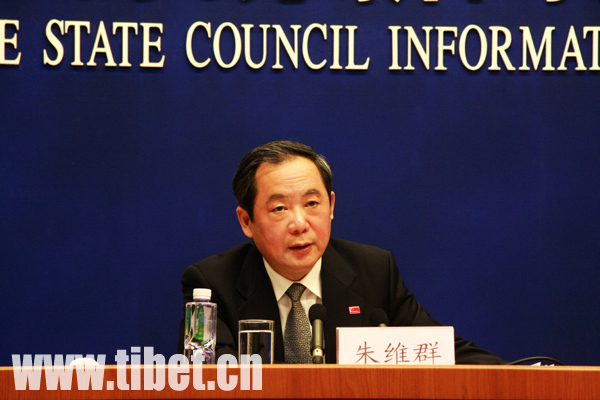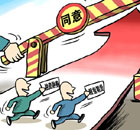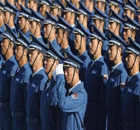Government and Policy
Press conference on central govt's contacts with Dalai Lama (Text)
(Tibet.cn)
Updated: 2010-02-11 11:26
 |
Large Medium Small |
At 10:00 am February 2, 2010, Tuesday, the State Council Information Office held a press conference, in which Mr. Zhu Weiqun, Executive Vice-Minister of the United Front Work Department of the CPC Central Committee and some other officials were invited to introduce the latest talks between the Central Government officials and the private representatives of the 14th Dalai Lama. Guo Weimin, director of the State Council Information Office press department hosts the press conference.
The following is the text record for this conference:
Guo Weimin: Ladies and gentlemen, good morning. Welcome to today's press conference.
We have invited Zhu Weiqun, Executive Vice-Minister of the United Front Work Department of the CPC Central Committee, Sitar, Vice-Minister of the United Front Work Department of the CPC Central Committee and Nyima Tsering, Vice-Chairman of the People's Congress of the Tibet Autonomous Region to introduce the latest talks between the Central Government officials and private representatives of the 14th Dalai Lama, and they are also ready to answer reporters' questions. Now, let's welcome Vice-Minister Zhu Weiqun to talk first.
|

Zhu Weiqun, Executive Vice-Minister of the United Front Work Department of the CPC Central Committee at the press conference. [Photo/Tibet.cn] |
Zhu Weiqun: Ladies and gentlemen, I am very glad to see you here. I am also pleased to see more reporters today compared with the press conference held in November 2008. Now I would like to brief you on the major situation concerning the recent contact and talks with the 14th Dalai Lama's private representatives.
Zhu Weiqun: The 14th Dalai Lama's private representatives, Mr. Lodi Gyari, Mr. Kelsang Gyaltsen and three other assistants came back to China and stayed from January 26 to 31. Du Qinglin, Vice-Chairman of the National Committee of the Chinese People's Political Consultative Conference (CPPCC) and Minister of the United Front Work Department of the CPC Central Committee, had an interview with them. Sitar, Vice-Minister of the United Front Work Committee of the CPC Central Committee, Nyima Tsering, Vice-Chairman of the People's Congress of the Tibet Autonomous Region and I talked to them for a whole day. We also arranged them to visit the late Chairman Mao Zedong's former residence at Shaoshan as well as the Xiangxi Tujia and Miao Autonomous Prefecture in Hunan.
Zhu Weiqun: In his interview with the private representatives of the 14th Dalai Lama, Vice-chairman Du Qinglin talked about the Central Government's successful response to the global financial crisis, the celebration of the 60th anniversary of the founding of the PRC as well as the Fifth National Conference on Work in Tibet held recently by the CPC Central Committee and the State Council. He pointed out that this conference established the strategic target for Tibet to achieve leap-forward development and long-lasting peace and stability. The conference especially demonstrated the brilliant achievements in Tibet in the new century and stressed various tasks so as to implement the "moderate prosperity" program in an all round way in Tibet, to ensure and improve the people's livelihood, to promote ecological environment construction and protection as well as Tibetan culture preservation and development. All of these show that the CPC Central Committee and the Central Government attach high importance to Tibet's socio-economic development and improved living quality of people of various ethnic groups in Tibet.
Vice-Chairman Du Qinglin pointed out that if the 14th Dalai Lama does wish to see progress made during the talks and improved relations with the Central Government, he should respect history, face up to reality and go with the times, and make a thorough self-examination of his words and deeds and radically correct his political propositions.
Vice-Chairman Du Qinglin stressed the following aspects:
1) The State's interests should not be infringed on. There is no room to talk about the issues concerning State sovereignty and territory, and there is no possibility for the slightest compromise.
2) The PRC's Constitution and the guiding principals should not be trampled on. The so-called "Greater Tibet" and "high degree of autonomy" obviously violate the PRC's Constitution. Only if they completely give up their separatist stand could contact and talks between the Central Government and the 14th Dalai side have a foundation and the 14th Dalai Lama have a way out.
3) National dignity brooks no vilification. Their contact and talks with the Central Government will make no progress if the 14th Dalai Lama continues to engage in anti-China propaganda and sabotage activities in the international arena, a move that shows he lacks fundamental respect and sincerity.
4) Common wishes of people of various ethnic groups in China should not be violated. The people in Tibet cherish stable society, so any infiltrative and sabotage activities will not succeed. But, these activities will create obstacles for contact and talks and will make the 14th Dalai Lama more isolated.
Zhu Weiqun: In our talks with Lodi Gyari and his party, we first pointed out that more than one year has passed since the previous contact in November of 2008. This was the longest interval after we resumed contact and talks in 2002. The major reason lies in the fact that they openly declared at the "special meeting on the future of Tibet" held in November 2008 that they would cease contact and talks with the Central Government. Even in such a situation, the Central Government did not shut the door to contact and talks, and, instead, the Central Government scheduled the contact and talks according to their request; this fully shows our sincerity and consistent attitude.
Zhu Weiqun: In the last talk, Lodi Gyari presented us a "Memorandum for All Tibetans to Enjoy Genuine Autonomy". Ambigious words were intentionally used in this memorandum in an attempt to explain "Greater Tibet" and "high degree of autonomy". Actually, the essence of these words was "half independence" or "convert independence". Therefore, we solemnly refuted them. And this time, they presented us "Explanation to the Memorandum", declaring that they would not revise a single word in the "Memorandum for All Tibetans to Enjoy Genuine Autonomy", nor make any concession. In the "Explanation to the Memorandum", they reaffirmed that the "Tibet government-in-exile represents the interests of the Tibetans " and "as the legal representative of Tibetans, the 14th Dalai Lama enjoys the status which allows no doubt at any time." They declared that they would discuss with us about the "Tibet issue" and "the welfare of the 6 million Tibetans". We solemnly pointed out that the former local government of Tibet launched an armed rebellion on March 10, 1959. On the 28th, Premier Zhou Enlai issued the State Council decree ordering that the local government of Tibet be disorganized and its role be replaced by the Preparatory Committee for the Establishment of the Tibet Autonomous Region. The so-called "Tibet government-in-exile", composed of those who defected to India and gathered there, absolutely violates China's laws. On December 17, 1964, the State Council held its plenary session which adopted the "Decision on Dismissing the Dalai Lama from His Post". The Decision points out: "The Dalai Lama launched a treasonable armed rebellion in 1959, and then he organized an illegal government-in-exile and promulgated an illegal constitution. All of these have proved the fact that he already alienated himself from the motherland and the people." If the illegal government is not dissolved and the illegal constitution is not abolished, the clique will remain opposite to China's Central Government and the government of the Tibet Autonomous Region, and it is a political clique which violates the PRC Constitution and splits the motherland.
Zhu Weiqun: We solemnly point out that the Central Government and the government of the Tibet Autonomous Region under its leadership are the only representatives of the Tibetans. Lodi Gyari and his party are not qualified to discuss with us the affairs related to the Tibet Autonomous Region as they are only the private representatives of the 14th Dalai Lama. What they can do is to talk with us about things related to the future of the Dalai Lama and, at most, a small party around him, namely the questions as to whether the 14th Dalai Lama will stop splitting the motherland, and how to win the Central Government's confidence and gain the forgiveness of all Chinese people. The Central Government made clear its attitude toward the 14th Dalai Lama and his clique some 50 years ago, so did its attitude toward the "Memorandum for All Tibetans to Enjoy Genuine Autonomy" one year ago. What Lodi Gyari and his party should do is to correct their mistakes rather than to repeat the contents in the "Memorandum" and then produce the "Explanation to the Memorandum".
Zhu Weiqun: We point out that, if the 14th Dalai Lama does wish to improve his relations with the Central Government, he should first talk with the Central Government. However, after the last contact and talks, they continued to openly collude with various separatist forces to attack the Communist Party of China and the Central Government. They left no stone unturned to undermine social peace and stability in China, slandering and damaging the image of China, disturbing the State heads' visits to foreign countries and harming the safety of our nation's territory and sovereignty. The 14th Dalai Lama even openly and repeatedly declared. "No doubt, I am a son of India." He should clearly explain what he meant by this.
We emphatically point out that improving the relations with the 14th Dalai Lama is China's internal affair which outsiders have no right to make any opinions. However, the 14th Dalai Lama makes very frequent international activities in search of foreign support. In fact, he already plays a role of a troublemaker in the world, which will arouse the Chinese people to feel antipathy against him and will create obstacles to contact and talks.
Zhu Weiqun: The basic requests that the Central Government mentioned to the 14th Dalai Lama are as follows: we will make talks about the future of the 14th Dalai Lama and others around him so long as he really gives up trying to split the motherland, ceases activities conducted with a view to splitting the motherland, and openly admits Tibet is an inalienable part of China, Taiwan is an inalienable part of China, and the Government of the People's Republic of China is the only legal government representing China. The 14th Dalai Lama is already 75 years old, and we hope that he will face up to reality, change his stand and make a correct choice in his remaining years.
Zhu Weiqun: And now, my colleagues and I are ready to answer your questions. And you are welcome to ask sharp questions.







